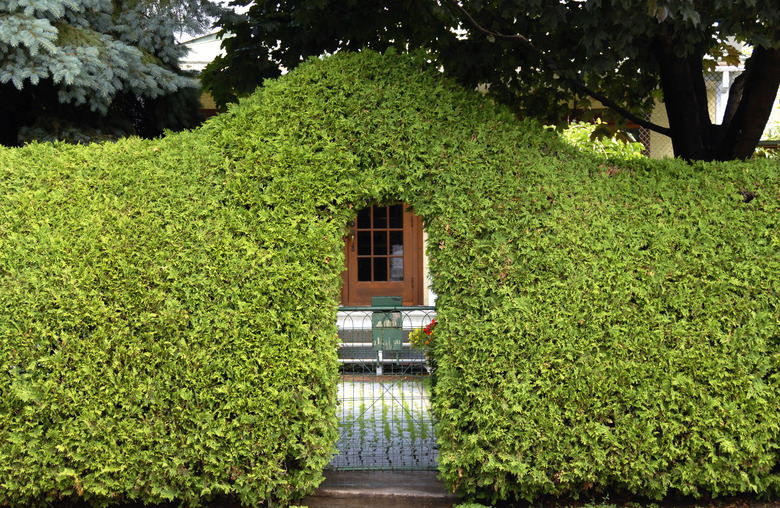Cedar Hedges & Mosquitoes
You might have seen mosquitoes flying out from your hedges at dusk, or maybe you were bitten while pruning your cedars on a summer morning. Your experience could have you believing that cedar hedges attract mosquitoes. They don't.
You might have seen mosquitoes flying out from your hedges at dusk, or maybe you were bitten while pruning your cedars on a summer morning. Your experience could have you believing that cedar hedges attract mosquitoes. They don't. The type of hedging around your garden has little to do with the number of mosquitoes you encounter.
Cedar Hedges
Western red cedar (Thuja plicata) and American arborvitae (Thuja occidentalis), while not true cedars (Cedrus spp.), are commonly called "hedging cedars." They grow in U.S. Department of Agriculture plant hardiness zones 5 through 7 and 2 through 8, respectively. These two shrubs and their various cultivars require full sun and moist soil. Because they grow in full sun, they are often the only means of nearby shelter for insects seeking to avoid the heat. The moist soil under hedges is enticing to some insects, regardless of the type of hedge. Planting cedar hedges will not invite any more mosquitoes than you already have.
- You might have seen mosquitoes flying out from your hedges at dusk, or maybe you were bitten while pruning your cedars on a summer morning.
- The moist soil under hedges is enticing to some insects, regardless of the type of hedge.
Mosquito Habitats
Mosquitoes breed in standing water, like that in birdbaths, gutters, wading pools and ponds, and can develop from egg to adult in as little as seven days. Adult mosquitoes rarely stray more than 1/2 mile from their original breeding site. They are most active at dusk and dawn, preferring to spend the hottest hours of the day in calm, shaded areas, such as hedges and shrubs.
Mosquito Prevention
Remove items in your yard that can hold water. Frequently replace the water in birdbaths and cover or empty children's pools. Clean debris from gutters so rainwater flows freely and treat rain barrels with mosquito tablets containing the natural bacteria Bacillus thuringiensis var. israelensis. Available at home and garden centers, Bti tablets kill immature mosquito larvae that live underwater. Drop one-quarter tablet into the rain barrel with up to 5 square feet of surface water. Do not apply Bti tablets into or near drinking water sources and wash your hands with soapy water after handing. When outdoors during active mosquito periods, protect yourself from bites with long-sleeved shirts and long pants or apply a DEET-based insect repellent.
- Mosquitoes breed in standing water, like that in birdbaths, gutters, wading pools and ponds, and can develop from egg to adult in as little as seven days.
Cedar Hedge Treatment
By eliminating mosquito breeding sites in your yard, you are less likely to encounter these pests in your cedar hedges. If you still seem to have too many mosquitoes seeking shelter in your cedar hedges because of nearby breeding sites, treat the hedge with a pyrethrin-based, outdoor mosquito spray or fogger. Pyrethrin targets the nervous systems of insects. Spray the area at dusk when mosquitoes are most active and when beneficial insects, such as bees, are inactive. Avoid using pyrethrin products near ponds and water features with fish in them because they are highly toxic to aquatic life. Dilute 1 part of pyrethrin concentrate in 7 parts of water and mist or fog the hedge area. Check the product's label, as instructions and rates vary by brand. Protect your skin and eyes during application and avoid inhaling the mist. Repeat the application once or twice per week, as necessary.
- By eliminating mosquito breeding sites in your yard, you are less likely to encounter these pests in your cedar hedges.
- If you still seem to have too many mosquitoes seeking shelter in your cedar hedges because of nearby breeding sites, treat the hedge with a pyrethrin-based, outdoor mosquito spray or fogger.
References
- Missouri Botanical Garden: Plant Finder — Western Red Cedar
- Missouri Botanical Garden: Plant Finder — American Arborvitae
- UC Statewide IPM Online: Arborvitae — Platycladus Orientalis, Thuja Occidentalis Western Red Cedar — Thuja Plicata
- State of Connecticut: Connecticut Mosquito Management Program
- Penn State College of Agricultural Sciences: Mosquito Biology and Control
